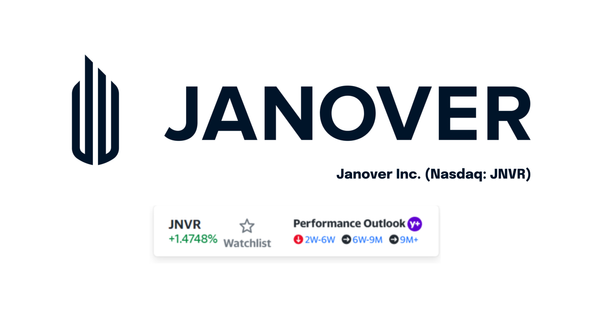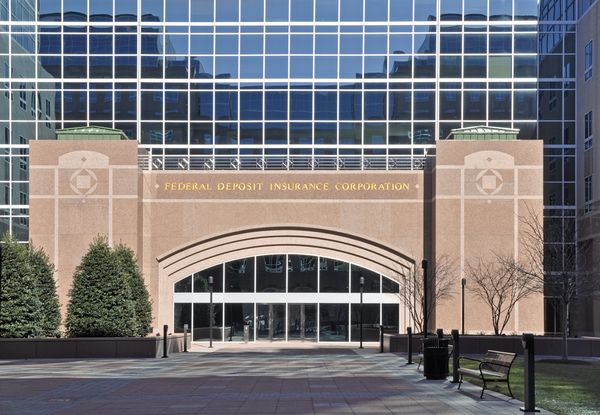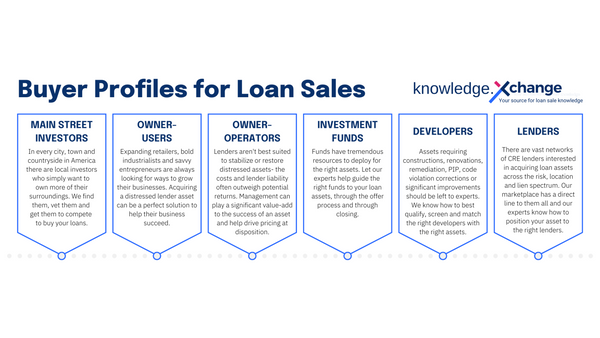Considering Purchasing a Distressed CRE Loan? Know Your Seller

Looking to buy a distressed commercial real estate (CRE) loan? Be prepared to encounter the three primary types of sellers—banks, non-banks and special servicers. Escrow requirements, due diligence periods, documentation, quality of collateral, and speed to close vary widely depending on the kind of seller you’re working with.
As you embark on a distressed CRE loan purchase, the following are what you can expect from these three types of sellers.
Banks: No due diligence, moderate speed
Commercial banks, comprising public or private depository institutions required to hold a federal, state or local bank charter, provide loans for property investors and investment funds, businesses and CRE developers.
Banks are likely to pursue a workout or a loan modification before they move to foreclosing or selling the loan. Once it decides that a loan sale is in order, a bank will typically look to sell the NPL to a select group of trusted investors—despite the strong likelihood in terms of leaving money on the table
A bank is motivated to sell a CRE non-performing loan (NPL) for a few reasons: 1) to stay in compliance with risk regulations; 2) to avoid liability for environmental contamination, a going concern use or other risks; or 3) to avoid continuing losses when a borrower is in technical, financial or maturity default. In some instances, a bank may execute a “relationship sale,” in which the goal is to unload every single loan—performing or not—held by a now-undesirable borrower.
Speed of execution: Moderate
Once a bank decides to sell a distressed CRE loan, it will want to quickly remove the loan from the balance sheet—possibly within hours if they receive an offer worth considering. Since the bank services the loan itself, you are only one or two people away from person who decides whether to accept your offer. Getting to closing predictably happens in less than 30 days. If you can move quickly, you’ll be a more attractive option to the bank in a bidding war.
Due diligence period: None
When purchasing a distressed CRE loan from a bank, don’t expect a due diligence period. There won’t be any. However, because banks are highly regulated, you’ll receive an accurate, standard set of loan docs, and most likely don’t need to worry about inaccuracies or authenticity.
Financial terms: Good (sort of)
Banks will request an all-cash offer with no contingencies. Expect to wire the cash to the bank directly. The CRE loan you acquire will probably have a better interest rate than a loan acquired from other capital sources, and it will probably be full recourse. If the borrower continues to fail to meet the loan terms, you can seize the loan collateral and other assets of the borrower. The potential downside is that the property may lack insurance, and it may carry a lien for delinquent property taxes. Also, don’t expect a rapid warranty.
From a buyer’s perspective, it’s good to deal with a bank. You’ll likely access a high-quality asset and benefit from a high likelihood of successful deal execution. But buyer beware! Just because the bank is selling an NPL doesn’t mean a fire-sale price. Banks are still looking to maximize recoverable value.
Non-banks: Fast execution, negotiable due diligence
Non-bank lenders include private lenders, bridge lenders, hard money lenders, credit unions, CMBS lenders, life insurance companies, and housing-focused government-sponsored enterprises (GSEs) like Fannie Mae, Freddie Mac, USDA and SBA.
Private, bridge and hard money lenders are unregulated lenders and typically lend on riskier collateral and businesses than a bank does. For example, a one- to three-year bridge loan is typical for stabilizing an asset to the point at which the borrower can sell it or secure permanent financing. If the borrower is flailing at stabilizing the property yet, that’s more risk for you.
Life Insurance companies, in contrast, are more conservative because they are beholden to policyholders and shareholders. They tend to focus on stabilized and less-risky CRE assets and hold the loans on their balance sheets for the life of the loan.
Non-bank lenders typically sell their loans when they need liquidity. Investment fund participants may decide to withdraw their money, for example, forcing the need to raise additional funds.
Speed of execution: Lightning-fast
From a buyer’s perspective, the non-bank option offers the fastest road to closing. Non-bank lenders tend to have basic approval processes and fewer decision makers than banks.
Due diligence period: Negotiable
Non-bank sellers often allow for due diligence periods and even physical loan document review for as long as 10 days.
Financial terms: it depends
When purchasing a NPL from a non-bank lender, expect to see a higher interest rate than you would with a bank loan. The terms will often, but not always, be full recourse. If funds are in escrow at the time of sale, you can negotiate to have the funds transferred to you. Typically, six to 12 months of interest, taxes and insurance payments are collected at close. You’ll want to know how much is in escrow and where that money is going, because it has a dollar-for-dollar impact on the value of the NPL.
Special servicers: Slow to close, no due diligence, but fewer surprises
A special servicer is engaged by a CMBS trust when a CRE loan is in technical, monetary or maturity default. The special servicer closely monitors the management and operations of the collateral, communicates with borrower and tries to make the CMBS trust whole. Servicers don’t sell NPLs directly—they are required in their service agreements to sell through a third party.
Speed of execution: Unhurried
Servicers typically have a complicated and layered pricing approval process that affects the overall speed of execution. Gaining approvals can take several months. Once pricing is approved, you can expect to close within seven days.
Due diligence period: None
When purchasing a NPL from a third party representing a special servicer, expect zero days of due diligence. However, you’ll also receive very professional and thorough documentation accompanied by accurate payoff statements that account for every cent. The selling agent will respond to requests and give you everything you need upfront.
Financial terms: Predictable
Servicers never let management fees, insurance payments and property taxes lapse. That means fewer surprises down the road for you.
Knowledge is power
As a buyer of a NPL, understanding the expectations of the three primary seller types will help you know what to expect. Buying an NPL CRE usually involves some twists and turns along the way, but knowledge will give you the power—and the patience—for a successful close.






















